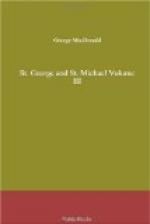’If thou didst right, wherefore should I be angry? If thou didst wrong, I am well content to know that thou wilt be sorry therefor as soon as thou seest it, and before that thou canst not, thou must not, be sorry. I am sure that what thou knowest to be right that thou will do, and it seemeth as if God himself were content with that for the time. What the very right thing is, concerning which we may now differ, we must come to see together one day—the same, and not another, to both, and this doing of what we see, is to each of us the path thither. Let God judge us, Dorothy, for his judgment is light in the inward parts, showing the truth and enabling us to judge ourselves. For me to judge thee and thee me, Dorothy, would with it bear no light. Why, Dorothy, knowest thou not—yet how shouldst thou know? that this is the very matter for the which we, my father and his party, contend—that each man, namely, in matters of conscience, shall be left to his God, and remain unjudged of his brother? And if I fight for this on mine own part, unto whom should I accord it if not to thee, Dorothy, who art the highest in soul and purest in mind and bravest in heart of all women I have known? Therefore I love thee with all the power of a heart that loves that which is true before that which is beautiful, and that which is honest before that which is of good report.’
What followed I leave to the imagination of such of my readers as are capable of understanding that the truer the nature the deeper must be the passion, and of hoping that the human soul will yet burst into grander blossoms of love than ever poet has dreamed, not to say sung. I leave it also to the hearts of those who understand that love is greater than knowledge. For those who have neither heart nor imagination—only brains—to them I presume to leave nothing, knowing what self-satisfying resources they possess of their own.
The pair wandered all over the ruins together, and Dorothy had a hundred places to take Richard to, and tell him what they had been and how they had looked in their wholeness and use—amongst the rest her own chamber, whither Marquis had brought her the letter which mistress Upstill had found so badly concealed.
Then Richard’s turn came, and he gave Dorothy a sadly vivid account of what he had seen of the destruction of the place; how, as if with whole republics of ants, it had swarmed all over with men paid to destroy it; how in every direction the walls were falling at once; how they dug and drained at fish-ponds and moat in the wild hope of finding hidden treasure, and had found in the former nothing but mud and a bunch of huge old keys, the last of some lost story of ancient days,—and in the latter nothing but a pair of silver-gilt spurs, which he had himself bought of the fellow who found them. He told her what a terrible shell the Tower of towers had been to break—how after throwing its battlemented crown into the moat, they had in vain attacked the walls, might almost as well have sought with pickaxes and crowbars to tear asunder the living rock, and at last—but this was hearsay, he had not seen it—had undermined the wall, propped it up with timber, set the timber on fire, and so succeeded in bringing down a portion of the hard, tough massy defence.




